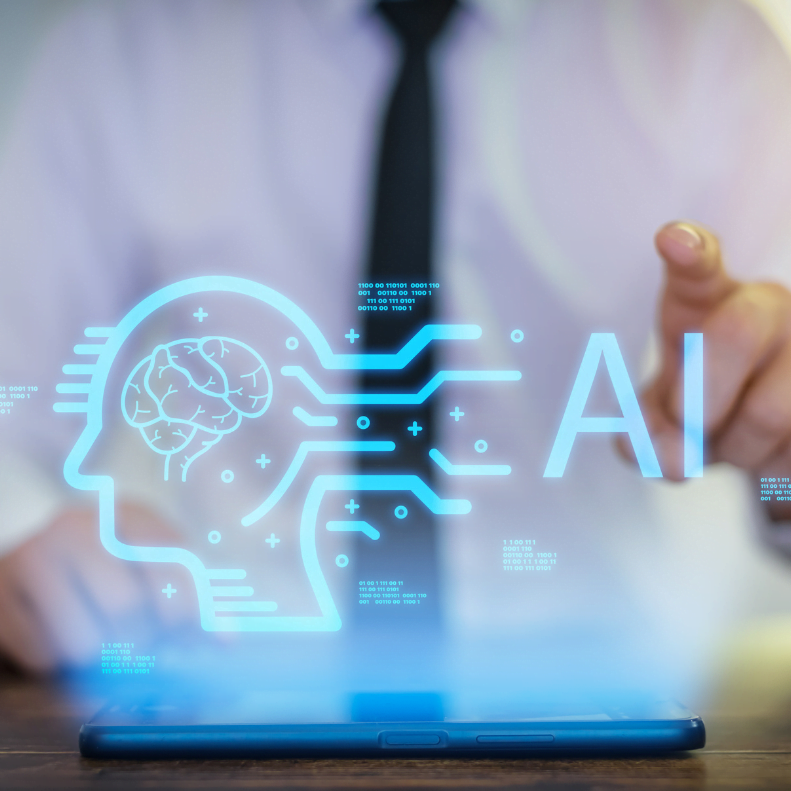Chatbots on the Couch:
The Future of AI in Mental Health
- Rytlife
- Charu Lavania & Neethu Prakashan
Highlights
- AI-driven health chatbots are revolutionising healthcare decision-making and therapy effectiveness.
- Research shows AI-based tools are increasingly accepted and effective in reducing psychological symptoms.
- Healthcare professionals see AI benefits but are cautious about its emotional intelligence limitations.
- Ongoing refinement of AI in mental healthcare is critical for effective, patient-centred integration.
In the evolving landscape of healthcare, technology, particularly artificial intelligence (AI), has been pivotal in adapting to the escalating demands for health services. AI, often described as a “thinking machine,” was initially developed to imitate and potentially supplant human cognitive abilities. This innovation has led to AI-driven systems like health chatbots significantly transforming decision-making in healthcare, offering new opportunities to enhance the reach and effectiveness of therapeutic interventions (Oladimeji et al., 2023). A mixed-methods study by Nadarzynski et al. (2019), using interviews and surveys, revealed moderate acceptability of AI-led health chatbot services, with two-thirds of participants open to engaging with these technologies. This trend underscores a growing interest in AI’s potential to revolutionise healthcare delivery.
The integration of AI in healthcare, especially in mental health services, is gaining momentum. AI’s emergence is particularly notable in addressing challenges exacerbated by events like the COVID-19 pandemic. It has been instrumental in connecting people to supportive social networks and providing personalised plans for mental and physical health enhancement (Oladimeji et al., 2023). Naslund et al. (2016) highlight AI-based online support platforms’ role in fostering communities where individuals can share experiences and receive tailored strategies for emotional and physical well-being.
Health chatbots, powered by AI, transform decision-making, offering new opportunities to extend the reach and effectiveness of therapeutic interventions (Oladimeji et al., 2023).



Further emphasising AI’s potential, Firth and colleagues (2017) conducted a meta-analysis examining the impact of smartphone applications and web-based chatbots on depressive symptoms. Their findings suggest these tools can significantly alleviate such symptoms, supporting their use in managing depression. Additionally, these technologies aid mental health professionals in decision-making through analysis of patients’ medical records, behaviours, and social media activities (Irshad et al., 2022). Exploring the perceptions of mental health professionals, Sweeney et al. (2021) found that the majority recognized the advantages of chatbots in mental healthcare. However, concerns were raised about the technology’s ability to understand and exhibit human emotions, despite its recognized utility in client self-management. Inkster et al. (2018) provided a practical assessment of Wysa, an AI-enabled mental health app, by analysing real-world data from users self-reporting depressive symptoms. The study delineated two user groups based on app engagement levels, uncovering a correlation between high app usage and improvement in symptoms, underscoring the app’s efficacy and user satisfaction.
Looking ahead, AI’s potential in enhancing patient-centred treatments, diagnostic accuracy, and clinical outcome prediction is immense. However, the technology’s full impact, both beneficial and adverse, requires further exploration. This exploration should focus on how AI-based therapies directly influence patient responses and any resultant changes in mental health (Maricar Agapito, 2023). The journey towards effectively integrating AI into mental health care necessitates continuous evaluation and adaptation of these technologies, ensuring they align with the evolving needs of mental health seekers.



References
Barrett, M., Boyne, J., Brandts, J., Brunner-La Rocca, H. P., De Maesschalck, L., De Wit, K., ... & Zippel-Schultz, B. (2019). Artificial intelligence supported patient self-care in chronic heart failure: a paradigm shift from reactive to predictive, preventive and personalised care.
Epma Journal, 10, 445-464.
Firth, J., Torous, J., Nicholas, J., Carney, R., Pratap, A., Rosenbaum, S., & Sarris, J. (2017). The efficacy of smartphone‐based mental health interventions for depressive symptoms: a meta‐analysis of randomized controlled trials.
World Psychiatry, 16(3), 287-298.
Inkster B, Sarda S, Subramanian V (2018). An Empathy-Driven, Conversational Artificial Intelligence Agent (Wysa) for Digital Mental Well-Being: Real-World Data Evaluation Mixed-Methods Study.
JMIR Mhealth Uhealth; 6(11):e12106.
https://mhealth.jmir.org/2018/11/e12106. DOI: 10.2196/12106Maricar Agapito, R. (2023, August 9). Role of artificial intelligence and its impact in mental healthservicesHIMSS.
Indian Journal of Psychological Medicine, 42(5_suppl)
https://www.himss.org/resources/role-artificial-intelligence-and-its-impact-mental-health-serviceNadarzynski T, Miles O, Cowie A, Ridge D (2019). Acceptability of artificial intelligence (AI)-led chatbot services in healthcare: A mixed-methods study.
DIGITAL HEALTH.;5. doi:10.1177/2055207619871808
Naslund, J. A., Aschbrenner, K. A., Marsch, L. A., & Bartels, S. J. (2016). The future of mental health care: peer-to-peer support and social media.
Epidemiology and psychiatric sciences, 25(2), 113-122.
Oladimeji, K. E., Nyatela, A., Gumede, S., Dwarka, D., & Lalla-Edward, S. T. (2023). Impact of artificial intelligence (AI) on psychological and Mental Health Promotion: An Opinion Piece.
New Voices in Psychology.
https://doi.org/10.25159/2958-3918/14548Sweeney, C., Potts, C., Ennis, E., Bond, R., Mulvenna, M. D., O’neill, S., Malcolm, M., Kuosmanen, L., Kostenius, C., Vakaloudis, A., Mcconvey, G., Turkington, R., Hanna, D., Nieminen, H., Vartiainen, A.-K., Robertson, A., & Mctear, M. F. (2021). Can Chatbots Help Support a Person’s Mental Health? Perceptions and Views from Mental Healthcare Professionals and Experts.
ACM Transactions on Computing for Healthcare, 2(3), 1–15.
https://doi.org/10.1145/3453175Search
Recent Comments
- No Comments
- What is artificial intelligence?
- Limited Adoption of AI in Mental Health
- AI's Ongoing Development
- Benefits and Challenges of AI in Mental Health
- Ethical Considerations in AI Integration
Keywords
- Artificial Intelligence
- Mental Health
- Health Chatbots
- Therapeutic Interventions

